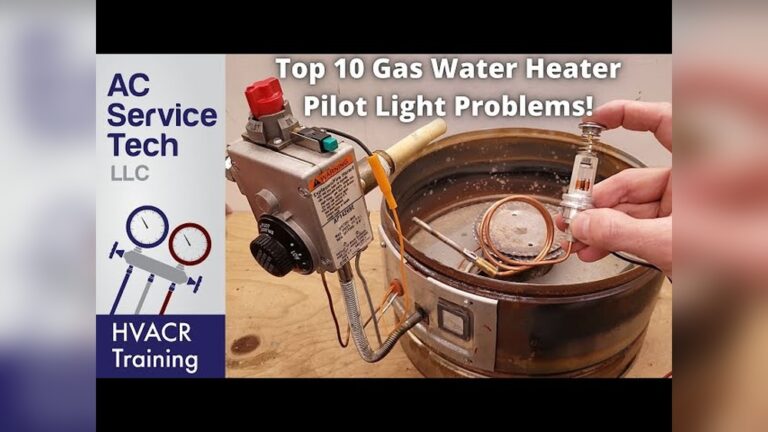Have you ever wondered if your gas water heater needs to be plugged in? You’re not alone.
Many homeowners find themselves scratching their heads over this common question. Understanding how your gas water heater works can save you time, money, and headaches. We’ll unravel the mystery and give you clear, straightforward answers. You’ll discover whether your gas water heater requires a plug, and why it matters for your home’s efficiency and safety.
Stick with us, and you might just find that maintaining your water heater becomes a breeze. Curious? Let’s dive in and clear up the confusion once and for all.

Credit: forum.nachi.org
Gas Water Heater Basics
Gas water heaters heat water for homes. Gas burners warm the water. Thermostats control the temperature. Tanks store the hot water. Pipes move the water to taps. These heaters use natural gas or propane. The pilot light starts the heating process. Valves control the gas flow. Vents remove gases safely. Insulation keeps the water hot longer. Pressure relief valves prevent explosions.
Gas water heaters need gas to work. They do not need electricity to heat water. They use gas for burning and heating. Some parts may use electricity. Electric igniters start the heater. Digital displays show temperature. Fans help vent gases. These parts need power outlets. Not all heaters have these. Older models use pilot lights. They work without electricity.

Credit: waterheatertimer.org
Power Requirements
Gas water heatersmostly use gas for heating water. They do not need electricity for heating. Electricityis used for controls and timers. It helps the heater work safely and efficiently.
Electricity powers the ignition system. It lights the gas burner. It also runs the digital thermostat. This keeps the water temperature steady. Without electricity, some heaters might not start.
Some gas heaters need a plug for their fan. The fan helps move air for better burning. In some models, the control panelneeds power to work. If the heater has a blower, it needs electricity. This helps push hot air through vents.
Types Of Gas Water Heaters
Traditional tank models store hot water in a large container. The tank keeps the water warm until you need it. Most of these heaters do not need electricity to work. They use gas to heat the water. But, some have electric parts for extra features. For example, timers or digital displays. These features might need plugging in. Always check the model to be sure. Big tanks can run out of hot water. It takes time to heat more water. This is a key point to remember.
Tankless systems heat water only when you need it. They are small and save space. Many use gas to heat the water. Some models have electric ignition. This means they need power to start. No big tanks means no running out of hot water. But, they might not work well with many taps at once. Always check if power is needed. This can be important for homes without constant electricity.

Credit: forum.nachi.org
Pros And Cons Of Plugging In
Gas water heaters typically don’t need electricity. They operate using natural gas or propane. Plugging in might be necessary for models with electric igniters or controls.
Energy Efficiency Benefits
Plugging in a gas water heater can save energy. The heater uses less gas when plugged in. Electric controls help the heater work better. Heaters heat water faster with electric support. Hot water is ready quickly. This means less waiting. Plugged-in heaters may use less energy. Bills might be lower. Saving money is always nice.
Potential Drawbacks
Not all heaters need a plug. Some work fine without it. Electricity costs money. Bills can go up if the heater needs a lot of power. Plugs mean more cords. More cords can look messy. Safety is important too. Cords must be safe and not in the way. Outlets should be close to the heater. Tripping on cords is not fun.
Safety Considerations
Gas water heaters mostly work without electricity. Some types might need power. For example, models with electric ignitions. Always ensure safe electrical connections. Use a grounded outlet if needed. Avoid using extension cords. Check for any frayed wires. Keep the area around the heater dry. Water and electricity don’t mix. A circuit breaker is useful for extra safety.
Gas leaks are dangerous. Always check for leaks. Use a gas detector for safety. Smell gas? Open windows right away. Evacuate the area and call for help. Never use flames or sparks near the leak. Regular maintenance helps prevent leaks. Ensure all fittings are tight. Check the pilot light often. If it goes out, relight it carefully. Always follow the manufacturer’s instructions.
Maintenance Tips
A gas water heater doesn’t need to be plugged in, as it uses gas for heating water. Electricity is only required for electronic ignition or digital displays. Regular maintenance ensures efficient operation and extends lifespan.
Regular Inspection
Check your gas water heateroften. Look for any leaks or rust. These can cause problems later. Clean the area around the heater. Dust and dirt can harm it. Listen for strange noises. These might mean something is wrong. Make sure the pilot light is on. If it’s out, relight it.
Troubleshooting Common Issues
If the water is not hot, check the thermostat. It might need adjusting. Look for any gas smell. If you smell gas, turn off the heater and call a professional. Check the water pressure. Low pressure can mean blockage. If the heater keeps shutting off, it might need a new thermocouple.
Future Of Gas Water Heaters
Gas water heaters have seen many changes. Modern technology has made them smarter. Sensors now help in adjusting the temperature. This makes them more efficient. Some heaters connect to your smartphone. You can control them from anywhere. This makes life easier.
Gas water heaters are getting better for the Earth. Sustainable designs use less energy. This helps in saving money and resources. New models produce less pollution. This is good for our environment. Companies are always thinking of new ideas. They want to make heaters more green.
Conclusion
Gas water heaters usually don’t need a plug. They rely on gas. Electricity is only necessary for igniters or fans. Check your model for specifics. Regular maintenance ensures efficient operation. Always follow safety guidelines. A well-maintained heater saves money. It also lasts longer.
Understanding your heater helps avoid problems. Consult a professional if unsure. Proper knowledge ensures safety and efficiency. Keep learning about your appliances. It’s beneficial. Your home will thank you.


